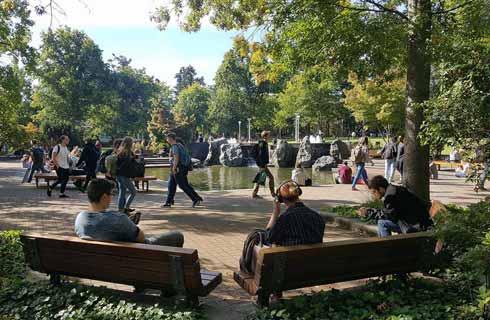运动与运动心理学理学硕士
MSc Sport and Exercise Psychology

学历文凭
Masters Degree (Taught)

专业院系
Psychology

开学时间

课程时长

课程学费

国际学生入学条件
IDP—雅思考试联合主办方

雅思考试总分
6.5
了解更多
雅思考试指南
- 雅思总分:6.5
- 托福网考总分:60
- 托福笔试总分:160
- 其他语言考试:PTE Academic - 62 (Minimum 54 in each component)
CRICOS代码:
申请截止日期: 请与IDP顾问联系以获取详细信息。
课程简介
The Sport and Exercise Psychology MSc is accredited by the British Psychological Society (BPS) as Stage 1 training, which when accompanied by the BPS Graduate Basis for Chartership (GBC) will provide a basis for professional development as a practitioner in the form of Stage 2 training, as well as further study, employment and enterprise. Facilitated by an expert team of researchers, and Health and Care Professions Council (HCPC) registered practitioners, this employment focused MSc provides you with key knowledge and practical skills to pursue a career path in sport and exercise psychology. Drawing on research led teaching, practical experiences of staff using real-life examples and innovative assessment strategies, we will ensure that you and your learning are at the forefront of a growing field. Sport and Exercise Psychologists seek to understand the ways in which thoughts and emotions can affect performance and exercise behaviour. Practitioners use this knowledge to provide psychological skills support, increase motivation and develop self-belief at all levels. Whether that is encouraging members of the public to adopt a more active lifestyle or optimising the performance of sports competitors. As the link between psychological wellbeing and physical activity becomes more defined, the demand for exercise psychologists in the healthcare sector has increased particularly in the areas of health promotion and rehabilitation. Similarly, there is a growing demand for Sport Psychologists to promote resilience and optimal behaviours in businesses, military, and emergency services. Previous graduates have gone on to work across a spectrum of sportse-sports and health-related roles locally and internationally. Some have completed further training and have become registered practitioners running their own private practice or employed with professional organisations including the English Institute of Sport, and Sunderland Association Football Club (SAFC). Other students have also pursued further postgraduate opportunities such as a PhD and are fulfilling research and lecturer roles at other universities.<br><br>You will graduate with a wide range of professional skills, which include the ability to: Critically evaluate current theories and evidence which can be applied to understand and solve complex issues in real world contexts, Communicate your ideas and findings effectively to variety of audiences, whether it be coaches, parents, athletes or exercise enthusiasts and Apply relevant ethical, legal and professional practice frameworks (such as those required by the BPS and HCPC). Your transferable skills will include oral and written communication, critical evaluation, problem solving, time management, IT and advanced statistical and qualitative analysis techniques. Graduates with Stage 1 and Stage 2 qualifications who are interested in sport psychology will be in a strong position to work with major sports teams or field-based consultation at major sporting events. Options for exercise psychologists include working in private rehabilitation, gyms, the NHS, GP exercise referral schemes and local Councils.
相关申请
 预科
预科 奖学金
奖学金 实习机会
实习机会 在校学习
在校学习 跨境学习
跨境学习 校园授课-线上开始
校园授课-线上开始 在线/远程学习
在线/远程学习
学校排名

世界排名401
数据源:泰晤士高等教育世界大学排名
关于诺森比亚大学

诺森比亚大学地理位置优越,位于英格兰东北部泰恩河畔纽卡斯尔市中心。作为一所研究型大学,诺森比亚大学致力于释放每个人的潜能,拥有来自 140 多个国家的 35000 多名多元化学生,为地区、国家和国际学生的生活带来积极影响。作为英国第二次荣登研究实力上升榜首的大学(REF 2021),诺森比亚大学利用其研究专长来改进和完善教学方法,提供持续改进的学习体验。通过将体验式学习融入课程,诺森比亚大学旨在为学生提供在学业及未来取得成功所需的实践经验。诺森比亚大学在2024年Whatuni学生选择奖中被评为设施榜单英国前十名,拥有丰富的专业设施。这些设施包括临床技能和工程实验室、专门的学生法律办公室以及商业诊所,学生可以在这里与实际客户合作完成实际项目。诺森比亚学生会(NSU)位于城市校区,是学生生活的中心。它提供各种一流的设施,包括酒吧、娱乐场所、咖啡厅、工作区、休闲区和会议室。NSU由学生运营,为学生提供一系列支持服务和活动,包括100多个满足不同兴趣和文化背景的俱乐部和社团。诺森比亚大学拥有多元化的师生群体,被评为世界百强年轻大学(泰晤士高等教育2024年年轻大学排名),地理位置优越,交通便利,方便前往英国国内外主要城市,对众多学生来说,诺森比亚大学是一个备受欢迎且极具吸引力的选择。
本校相关课程

具有Web开发学士学位的计算机科学(荣誉)
学历文凭
Bachelor Degree with Honours
开学日期
课程费用总额


旅游和活动管理(荣誉)文学士学位
学历文凭
Bachelor Degree with Honours
开学日期
课程费用总额


体育,运动和营养理学士(荣誉)学位
学历文凭
Bachelor Degree with Honours
开学日期
课程费用总额


体育管理理学士(荣誉)
学历文凭
Bachelor Degree with Honours
开学日期
课程费用总额


体育发展(荣誉)文学士学位
学历文凭
Bachelor Degree with Honours
开学日期
课程费用总额


体育教练理学士(荣誉)
学历文凭
Bachelor Degree with Honours
开学日期
课程费用总额

其他相关课程

MPsych高级心理学
 普利茅斯大学
普利茅斯大学泰晤士高等教育世界大学排名:590
学历文凭
Undergraduate Masters
开学日期
课程费用总额


心理学硕士(临床)
 南昆士兰大学
南昆士兰大学学历文凭
Masters Degree (Research)
开学日期
课程费用总额


心理科学学士
 迪肯大学
迪肯大学泰晤士高等教育世界大学排名:206
学历文凭
Bachelor Degree
开学日期
课程费用总额


MSc Business and Organisational Psychology (with Professional Experience)
 考文垂大学
考文垂大学泰晤士高等教育世界大学排名:637
学历文凭
Masters Degree (Taught)
开学日期
课程费用总额


Postgraduate Diploma in Arts - Applied Behavioural Analysis
 奥克兰大学
奥克兰大学学历文凭
Postgraduate Diploma
开学日期
课程费用总额


保护和灵长类动物行为-理学硕士
 肯特大学
肯特大学泰晤士高等教育世界大学排名:482
学历文凭
Masters Degree (Taught)
开学日期
课程费用总额


























